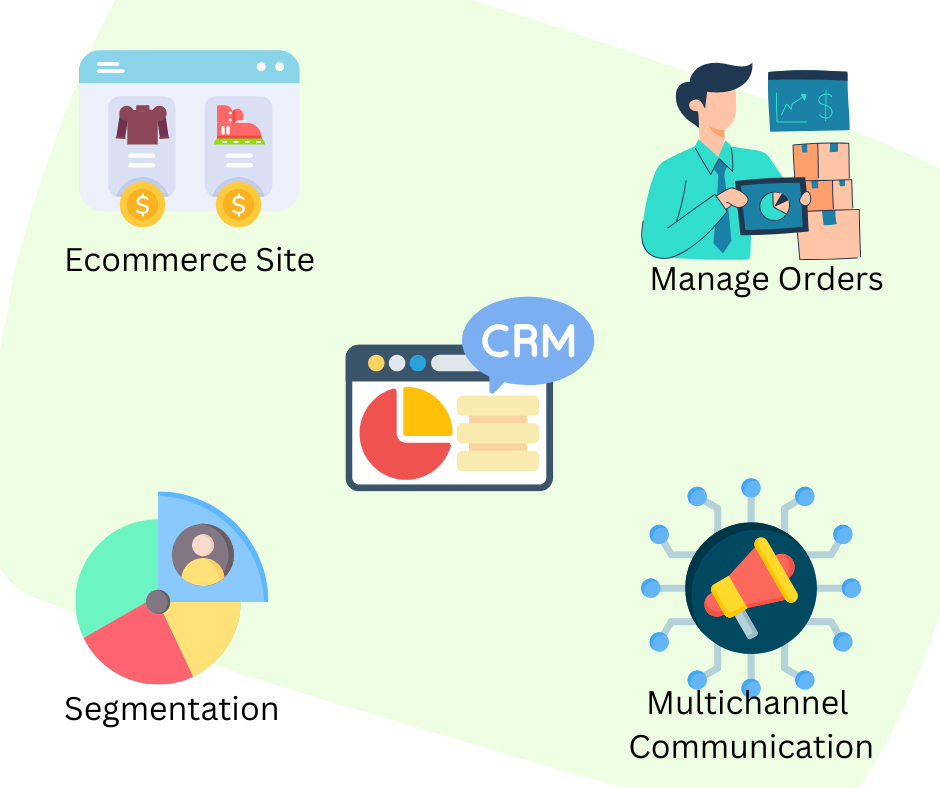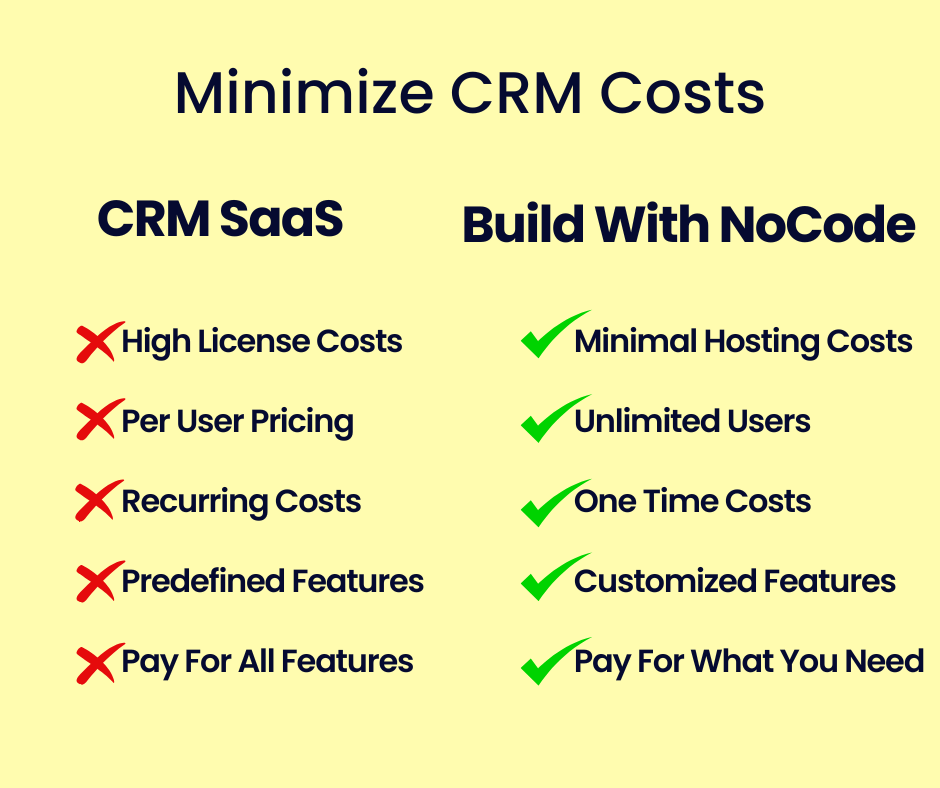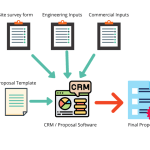For small ecommerce businesses, margins can be thin. Hence even a small boost in productivity can drastically improve business profitability. That's why a good CRM for small ecommerce business can be a game changer.
Why are CRMs essential? They streamline how you engage with customers. From tracking sales to delivering personalized marketing efforts, CRMs can significantly enhance your business operations. An efficient CRM allows you to understand your customers better and tailor your approach to meet their needs. This is vital in standing out in the competitive ecommerce landscape.
Investing in the right CRM can bolster customer loyalty and lift your sales figures. For any small ecommerce business wanting to grow and thrive, a well-chosen CRM is not just beneficial—it’s essential.
Typical CRM Requirements for Small Ecommerce Businesses
Small ecommerce businesses need a CRM system that's not just a hub for customer interactions but also a tool that drives growth. Here are some essential features:
- Customer Data Management: Keeping track of customer information is crucial. A CRM helps organize data to create personalized experiences and improve customer relations.
- Sales and Marketing Automation: Automation streamlines repetitive tasks. This saves time and allows businesses to focus on strategies that drive sales.
- Analytics and Reporting: Data-driven decisions are key to growth. A CRM provides insights into customer behavior, helping businesses adjust their strategies effectively.
- Integration with Ecommerce Platforms: A CRM that integrates smoothly with your ecommerce platform simplifies operations. It ensures data flows seamlessly between systems, reducing manual entry and errors.
- Easy-to-use Interface: Small businesses often lack extensive tech teams. An intuitive CRM allows users to manage the system efficiently without technical expertise.
- Scalability: Growth is a primary goal for small businesses. A scalable CRM supports expansion without needing a complete overhaul or excessive costs.
These CRM features not only assist with efficiency but also empower small businesses to focus on what matters most—growing their brand and customer base.
Key Features to Look for in an Ecommerce CRM
Selecting the right CRM can make a significant difference in your ecommerce business. Here are the key features you should consider:
- Advanced Segmentation for Targeted Marketing: This feature allows you to create specific customer segments based on their behavior, preferences, and purchase history. It helps you craft more personalized marketing strategies, which lead to better conversion rates.
- Integration Capabilities with Ecommerce Platforms: Ensure your CRM integrates seamlessly with platforms like Shopify, WooCommerce, or Magento. This connection lets you manage customer data efficiently and automates many aspects of your business process, saving time and reducing errors.
- Multi-Channel Communication: Your CRM should facilitate communication with customers across various channels—email, social media, chat, and more. This capability provides consistent customer service and a unified brand presence everywhere your customers are.
- Order Management Integration: By integrating order management within the CRM, your team can track orders, stock levels, and fulfillment directly from the CRM. It streamlines operations and helps customer service representatives resolve queries efficiently.
- Strong Data Security: Earning customer trust is vital. Your CRM should have robust security measures to protect customer information. Secure data handling also ensures compliance with regulations like GDPR and CCPA.
These features optimize operations and enhance customer interactions. They help you stay competitive by offering personalized, efficient, and secure shopping experiences.
CRM Comparison for Small E-commerce Businesses
| Feature | Fuzen | Zoho CRM | HubSpot CRM |
|---|---|---|---|
| Built for E-commerce Workflows | ✅ Tailored specifically for small stores | ❌ General CRM with e-comm add-ons | ❌ Not designed for e-commerce out of box |
| One-Time Pricing | ✅ No monthly fees, lifetime access | ❌ Monthly/user pricing starts ₹1,100 | ❌ Starts ₹1,600/user/month |
| Product & Order Tracking | ✅ Built-in dashboard with real-time data | ❌ Needs custom setup or add-ons | ❌ Requires Commerce Hub (extra cost) |
| No-Code Automation | ✅ Visual, drag-and-drop workflow builder | ✅ Basic rules (more on higher plans) | ✅ Available, but gated by paid tiers |
| Custom Fields & UI | ✅ Fully customizable without devs | ❌ Limited on lower plans | ❌ Full customization only on higher tiers |
| Google Sheets Integration | ✅ Native, seamless syncing | ✅ Possible via Zapier or API | ❌ Not directly supported |
| WhatsApp & Email Integration | ✅ Built-in for direct communication | ✅ Available via third-party apps | ✅ Available, but not e-commerce-focused |
| Shopify-Ready | ✅ Works effortlessly with online stores | ❌ Shopify needs add-ons or scripts | ✅ Native, but only on paid plan |
| User-Friendliness | ✅ Made for non-technical users | ❌ Steep learning curve | ✅ Easy interface, but layered features |
| Support & Onboarding | ✅ 1-on-1 onboarding + real human support | ❌ Standard ticketing support | ❌ Support tiers vary with pricing |
✅ Why Fuzen is the Smarter Pick
For small e-commerce brands, every tool should drive clarity and conversion — not complexity and cost. Fuzen eliminates the bloat of traditional CRMs with a lean, intuitive, no-code system built specifically for indie founders and D2C brands. With real-time dashboards, full customization, and no recurring fees, Fuzen is a practical, scalable choice from day one.
Popular CRM for Small Businesses
Navigating the array of CRM options can be tricky. To help, here are some popular CRM systems tailored for ecommerce:
Fuzen CRM
- Overview: Fuzen is a no-code CRM platform designed specifically for small e-commerce businesses. It offers real-time product tracking, lead management, and full customization without needing any coding or technical skills.
- Features: Custom dashboards, Google Sheets integration, WhatsApp/email automation, Shopify-ready workflows, product and order tracking.
- Pros: One-time pricing, built for non-tech users, highly customizable, fast setup, excellent for lean D2C teams.
- Cons: Not suited for large enterprise-level operations, fewer native third-party integrations compared to legacy CRMs.
- Pricing: No monthly fee — one-time hosting cost only.
HubSpot CRM
- Overview: HubSpot CRM offers a comprehensive platform for managing customer interactions and improving sales.
- Features: Dashboards, email tracking, customer feedback, integration with ecommerce platforms.
- Pros: User-friendly interface, free tier available, robust integrations.
- Cons: Advanced features can be expensive, may require training for beginners.
- Pricing: Free tier available, paid plans start at $50/month.
Zoho CRM
- Overview: Zoho CRM provides an adaptable platform with AI tools, ideal for a variety of business sizes.
- Features: Sales automation, visitor tracking, inventory management, AI assistance.
- Pros: Competitive pricing, strong AI features, customization options.
- Cons: Limited third-party integrations, some features require a learning curve.
- Pricing: Plans start at $14/month.
Smart CRM Use Cases for E-commerce Growth
A CRM isn't just for contact management — it powers automation, retention, and sales across your store. Here’s how small e-commerce brands use CRMs like Fuzen to grow efficiently.
- Customer Segmentation: Grouping buyers by behavior or purchase history is key to e-commerce customer segmentation strategies that drive more personalized campaigns and conversions.
- Cart Recovery Automation: With the right setup, your CRM can trigger automated cart abandonment emails the moment a shopper leaves checkout, recovering sales without manual follow-ups.
- Customer Lifetime Value: CRMs help you track high-value customers and run loyalty campaigns. Improving customer lifetime value becomes easier when you have real-time insights into purchase patterns.
- Upselling & Cross-Selling: Use data-backed triggers for CRM-based upselling strategies — offering complementary products at checkout or post-purchase to increase average order value.
- Post-Purchase Follow-Ups: Automating post-purchase CRM workflows like thank-you emails, delivery updates, and review requests helps maintain engagement and reduce churn.
- E-commerce Ticketing System: Turn your CRM into a lightweight support tool by managing all queries and tickets in one place, keeping full context on customer history and orders.
- Flash Sale Targeting: Target high-intent segments during promos. Effective CRM-powered flash sale strategies help boost urgency and maximize conversions with minimal manual effort.
- CRM-Based Retargeting: Sync your CRM with email or ad platforms to run CRM-based retargeting campaigns, bringing back cold leads through relevant and timely outreach.
CRM Integrations That Power E-commerce Growth
Connecting your CRM to the tools you already use — like your storefront platform — is one of the fastest ways to simplify operations, personalize experiences, and drive more conversions. Here’s how CRM integrations work with popular e-commerce platforms:
- Shopify Integration: When you integrate your CRM with Shopify, customer data, order history, and product behavior sync automatically, making it easier to segment shoppers, automate emails, and manage everything from one dashboard.
- WooCommerce Integration: If you run your store on WooCommerce, you can connect it to your CRM to personalize each user journey, set up behavior-based automation, and reduce manual tasks like tagging or follow-ups.
- BigCommerce Integration: Looking to scale on BigCommerce? A CRM integration lets you manage sales and customer relationships more efficiently — with centralized data, automated segmentation, and better campaign targeting.
- Magento Integration: With Magento, flexibility is key, and that’s exactly what you get when you integrate your CRM with Magento. Build custom workflows that match your storefront logic, sync real-time order updates, and streamline communications without writing code.
Best Practices for Building a Stronger E-commerce CRM Strategy
Product Descriptions That Sell
- Learn how to write better product descriptions that highlight benefits and reduce bounce rates
- Use clear formatting, persuasive language, and structured layouts to boost SEO
- Avoid generic copy and tailor messaging to your ideal buyer persona
Smarter Customer Service
- Apply proven customer service techniques to improve satisfaction and retention
- Automate responses while keeping support personalized and human
- Use CRM timelines to track queries and resolve faster
Clean Data Architecture
- Follow best database design practices for scalable customer and order data
- Avoid duplicates, inconsistencies, and messy structures that hinder reporting
- Organize product catalogs and transaction data for better CRM performance
Automation That Works
- Build efficient order workflows that reduce manual input
- Sync CRM with inventory and shipping tools to prevent delays
- Trigger post-order actions like tracking updates and follow-ups automatically
Data Security Basics
- Strengthen your store with essential security tips to protect customer information
- Learn how to manage access control and detect suspicious activity
- Ensure your CRM complies with privacy regulations and safe integrations
Compliance Essentials for E-commerce Brands
Staying compliant is critical not just for avoiding penalties, but for building long-term customer trust. Whether it’s handling payments, storing customer data, or managing regulated products, these compliance practices are essential for e-commerce businesses.
Payment Data Security
- Learn how to meet PCI compliance standards to secure customer payment info
- Prevent data breaches by encrypting transactions and managing access
- Understand the technical and legal steps to process payments safely
Customer Data Protection
- Align your CRM setup with key GDPR compliance principles like consent, access, and erasure
- Store and process customer data transparently and securely
- Reduce legal risk while increasing customer trust and loyalty
Legal Product Standards
- Ensure every product meets local product compliance regulations before listing
- Avoid penalties or delistings by following labeling and certification rules
- Build operational processes that catch compliance issues early
Build an Ecommerce CRM with NoCode Tools and AI
Building a CRM tailored to your specific needs can be a game-changer for your small eCommerce business. With no-code platforms and AI, you get a solution that's just right for you without breaking the bank.
- Full Customization: You can design a CRM that fits like a glove. Align every feature with what your business truly needs, making your operations smoother and more efficient.
- Cost-Effectiveness: Forget hefty monthly or yearly SaaS subscriptions. Building your own CRM with no-code tools means you only pay for what you need, leading to substantial savings.
- No Extensive Coding: Not a coding whiz? No problem! You can create a feature-rich CRM with just simple prompts, thanks to AI assistance.
- CRM Templates: You will find a wide range of CRM templates to select from. They give you the best starting point for building your customized CRM. The best part is you need to only pay once to buy a CRM template. There no expensive subscription based licenses. It's like getting a CRM lifetime deal.
- Significant Savings: It’s possible to save up to 80% on software development costs. This leaves you with more capital to put back into your business.
- Minimal Long-Term Costs: Once built, you only have hosting costs to consider. This keeps ongoing expenses low.
Fuzen is a fantastic solution for this. Its powerful nocode development tools and strong AI integrations make it a breeze to create, maintain, and scale a customized CRM. With Fuzen, you're not just building software; you're crafting a tool tailored to help your business grow and thrive.
Conclusion
Using a CRM can significantly elevate small ecommerce businesses by streamlining operations and improving customer relationships. A well-integrated CRM not only boosts sales but also enhances customer satisfaction by tracking customer interactions and data.
Moreover, building a customized CRM with Fuzen’s nocode tools offers incredible advantages. It allows businesses to create a system that perfectly matches their unique needs, avoiding expensive subscriptions. The cost-efficiency and ease of maintenance add to the appeal, making it a smart choice for small businesses.
By exploring Fuzen, businesses can fully leverage the potential of custom CRMs, gaining both freedom and substantial cost savings. The opportunity to scale and adjust as you grow is a game-changer. Consider embracing the tailored solutions Fuzen offers to take your ecommerce venture to new heights.

Pushkar is a seasoned SaaS entrepreneur. A graduate from IIT Bombay, Pushkar has been building and scaling SaaS / micro SaaS ventures since early 2010s. When he witnesses the struggle of non technical micro SaaS entrepreneurs first hand, he decided to build Fuzen as a nocode solution to help these micro SaaS builders.




